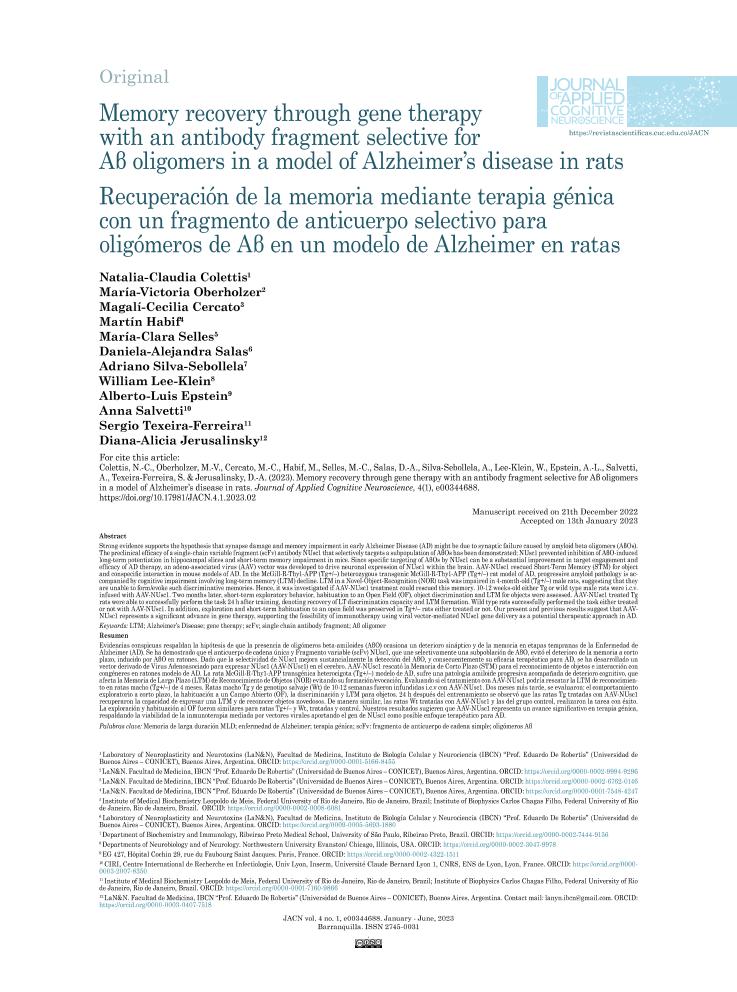Artículo
Evidencias conspicuas respaldan la hipótesis de que la presencia de oligómeros beta-amiloides (AβO) ocasiona un deterioro sináptico y de la memoria en etapas tempranas de la Enfermedad de Alzheimer (AD). Se ha demostrado que el anticuerpo de cadena única y Fragmento variable (scFv) NUsc1, que une selectivamente una subpoblación de AβO, evitó el deterioro de la memoria a corto plazo, inducido por AβO en ratones. Dado que la selectividad de NUsc1 mejora sustancialmente la detección del AβO, y consecuentemente su eficacia terapéutica para AD, se ha desarrollado un vector derivado de Virus Adenoasociado para expresar NUsc1 (AAV-NUsc1) en el cerebro. AAV-NUsc1 rescató la Memoria de Corto Plazo (STM) para el reconocimiento de objetos e interacción con congéneres en ratones modelo de AD. La rata McGill-R-Thy1-APP transgénica heterocigota (Tg+/–) modelo de AD, sufre una patología amiloide progresiva acompañada de deterioro cognitivo, que afecta la Memoria de Largo Plazo (LTM) de Reconocimiento de Objetos (NOR) evitando su formación/evocación. Evaluando si el tratamiento con AAV-NUsc1 podría rescatar la LTM de reconocimiento en ratas macho (Tg+/–) de 4 meses. Ratas macho Tg y de genotipo salvaje (Wt) de 10-12 semanas fueron infundidas i.c.v con AAV-NUsc1. Dos meses más tarde, se evaluaron: el comportamiento exploratorio a corto plazo, la habituación a un Campo Abierto (OF), la discriminación y LTM para objetos. 24 h después del entrenamiento se observó que las ratas Tg tratadas con AAV-NUsc1 recuperaron la capacidad de expresar una LTM y de reconocer objetos novedosos. De manera similar, las ratas Wt tratadas con AAV-NUsc1 y las del grupo control, realizaron la tarea con éxito. La exploración y habituación al OF fueron similares para ratas Tg+/– y Wt, tratadas y control. Nuestros resultados sugieren que AAV-NUsc1 representa un avance significativo en terapia génica, respaldando la viabilidad de la inmunoterapia mediada por vectores virales aportando el gen de NUsc1 como posible enfoque terapéutico para AD. Strong evidence supports the hypothesis that synapse damage and memory impairment in early Alzheimer disease (AD) might be due to synaptic failure caused by amyloid beta oligomers (AβOs). We demonstrated the preclinical efficacy of a single-chain variable-fragment (scFv) antibody NUsc1 that selectively targets a subpopulation of AβOs; NUsc1 prevented AβO-induced inhibition of long-term potentiation in hippocampal slices and short-term memory impairment in mice. Since specific targeting of AβOs by NUsc1 may be a substantial improvement in target engagement and efficacy for AD therapy, we developed an adeno-associated virus (AAV) vector to drive neuronal expression of NUsc1 within the brain. AAV-NUsc1 rescued short-term memory (STM) for objects and congeners interaction in mice AD models. Purpose: In heterozygous McGill-R-Thy1-APP transgenic (Tg+/–) rat model of AD, progressive amyloid pathology is accompanied by cognitive impairment involving long-term memory (LTM) decline. LTM in a novel-object-recognition (NOR) task was impaired in 4-month-old (Tg+/–) male rats, suggesting that they are unable to form/evoke such discriminative memories. Hence, we investigated if AAV-NUsc1 treatment could rescued this memory. Methods: 10-12 weeks-old either Tg or wild type male rats were i.c.v. infused with AAV-NUsc1. Two months later, short-term exploratory behavior, habituation to an open field (OF), object discrimination and LTM for objects were assessed. Results: AAV-NUsc1 treated Tg rats were able to successfully perform the task 24 h after training, denoting recovery of LT discrimination capacity and LTM formation. Wild type rats successfully performed the task either treated or not with AAV-NUsc1. Also, exploration and short-term habituation to an open field was preserved in Tg+/– rats either treated or not. Conclusions: Our present and previous results suggest that AAV-NUsc1 represents a significant advance in gene therapy, supporting the feasibility of immunotherapy using viral vector-mediated NUsc1 gene delivery as a potential therapeutic approach in AD.
Memory recovery through gene therapy with a single chain antibody fragment selective for Aβ oligomers in a model of Alzheimer’s disease in rats
Título:
Recuperación de la memoria mediante terapia génica con un fragmento de anticuerpo selectivo para oligómeros de Aβ en un modelo de Alzheimer en ratas
Colettis, Natalia Claudia ; Oberholzer, María Victoria
; Oberholzer, María Victoria ; Cercato, Magalí Cecilia
; Cercato, Magalí Cecilia ; Habif, Martin
; Habif, Martin ; Selles, Maria Clara; Salas, Daniela; Sebollela, Adriano; Klein, William L.; Epstein, Alberto Luis; Salvetti, Anna; Ferreira, Sergio Teixeira; Jerusalinsky, Diana Alicia
; Selles, Maria Clara; Salas, Daniela; Sebollela, Adriano; Klein, William L.; Epstein, Alberto Luis; Salvetti, Anna; Ferreira, Sergio Teixeira; Jerusalinsky, Diana Alicia
 ; Oberholzer, María Victoria
; Oberholzer, María Victoria ; Cercato, Magalí Cecilia
; Cercato, Magalí Cecilia ; Habif, Martin
; Habif, Martin ; Selles, Maria Clara; Salas, Daniela; Sebollela, Adriano; Klein, William L.; Epstein, Alberto Luis; Salvetti, Anna; Ferreira, Sergio Teixeira; Jerusalinsky, Diana Alicia
; Selles, Maria Clara; Salas, Daniela; Sebollela, Adriano; Klein, William L.; Epstein, Alberto Luis; Salvetti, Anna; Ferreira, Sergio Teixeira; Jerusalinsky, Diana Alicia
Fecha de publicación:
09/2023
Editorial:
Universidad de la Costa
Revista:
Journal of Applied Cognitive Neuroscience
e-ISSN:
2745-0031
Idioma:
Inglés
Tipo de recurso:
Artículo publicado
Clasificación temática:
Resumen
Archivos asociados
Licencia
Identificadores
Colecciones
Articulos(IBCN)
Articulos de INST.DE BIOLO.CEL.Y NEURCS."PROF.E.DE ROBERTIS"
Articulos de INST.DE BIOLO.CEL.Y NEURCS."PROF.E.DE ROBERTIS"
Articulos(IQUIFIB)
Articulos de INST.DE QUIMICA Y FISICO-QUIMICA BIOLOGICAS "PROF. ALEJANDRO C. PALADINI"
Articulos de INST.DE QUIMICA Y FISICO-QUIMICA BIOLOGICAS "PROF. ALEJANDRO C. PALADINI"
Citación
Colettis, Natalia Claudia; Oberholzer, María Victoria; Cercato, Magalí Cecilia; Habif, Martin; Selles, Maria Clara; et al.; Memory recovery through gene therapy with a single chain antibody fragment selective for Aβ oligomers in a model of Alzheimer’s disease in rats; Universidad de la Costa; Journal of Applied Cognitive Neuroscience; 4; 1; 9-2023; 1-16
Compartir
Altmétricas



